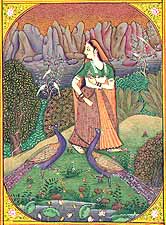E. Allen Richardson, Ph.D
| Publications | Study Abroad | Teaching | Service & Awards |
Teaching
 I am a Historian of Religion which, as a discipline, has grown through the twentieth century through the work of Rudolph Otto, Mircea Eliade and others. Historians of Religion are concerned with the unique, cultural contexts of religion and frequently work closely with Anthropologists of Religion. The History of Religions is often distinguished from theology which is the faith based exploration of religion. As a Historian of Religion I am also an Indologist and work closely with the religious and cultural traditions of India.
I am a Historian of Religion which, as a discipline, has grown through the twentieth century through the work of Rudolph Otto, Mircea Eliade and others. Historians of Religion are concerned with the unique, cultural contexts of religion and frequently work closely with Anthropologists of Religion. The History of Religions is often distinguished from theology which is the faith based exploration of religion. As a Historian of Religion I am also an Indologist and work closely with the religious and cultural traditions of India.
These disciplines have brought me to emphasize the role of transplanted religious traditions in diaspora in the United States. Three of the courses in Religious Studies at Cedar Crest College emphasize the role of Hindus, Buddhists and Muslims in America. We explore patterns of adaptation and assimilation and the ways in which transplanted religions both continue the rituals, doctrine and patterns of sectarian growth in the United States but at the same time initiate their own unique blend of religion and culture. For example, most Hindu temples in the United States have an educational component and provide classroom instruction to second generation Hindu youth. In India, this function is unnecessary since children grow up in a Hindu milieu and learn about religion in a wide variety of ways through the dominant culture.
I am also a strong proponent of experiential education. Most of my classes take field trips and visit Hindu and Buddhist temples or mosques in the United States. Students enrolled in Rel 225 ("Buddhism in America") receive meditation instruction at Mount Equity Buddhist zendo near Muncy, Pennsylvania. Later, the class visits a Tibetan Buddhist temple in northern New Jersey and a Chinese Buddhist temple in New York state that includes the largest Buddha in the western hemisphere.
I have carried this emphasis on learning through travel and firsthand experience to develop study abroad programs. Students enrolled in Rel 101 ("Ancient Egyptian Religion") have the option every two years of enrolling in a one credit experience in a ten day tour of Egypt. Similarly, students who participate in Rel 226 ("Hinduism in America"), taught in alternate years during the spring semester, travel to India during spring break.
Some of my students who have taken these extended journeys have described them as life changing experiences. I believe that is the function of education which in itself is a journey that takes us through a variety of forms of knowledge and perception. In particular, the study of global religious traditions in modern and ancient societies helps students explore cultural differences and understand religion as a vital part both of the search for meaning and the experience of transcendence.
Last Updated: 1/13/10
